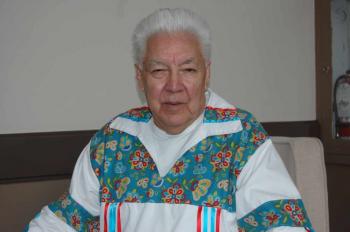Image Caption
By Shari Narine
Windspeaker Contributor
EDMONTON
“As far as traditional knowledge, I have a lot of learning to do,” said Bigstone Cree Elder Gilman Cardinal. He’s 73 years old. “We never stop learning,” he said.
Cardinal’s path to becoming an Elder was not the traditional one, with a feast, sweat lodge ceremony and four days and nights of fasting. His journey into Eldership began as a healing journey following a heart attack at the age of 50. He says he was dead for eight minutes.
He was living in Slave Lake at that time and was transported to Edmonton for care. And while “western medicine” helped, Cardinal says he still was not feeling his best.
His sister suggested he see a healer. So he travelled to Maskwacis and worked with late Elder Bert Crane off and on over three months.
“He worked with me towards my healing through different ceremony,” said Cardinal. “He healed me totally.”
Crane made a contract with Cardinal, an exchange of tobacco, and suggested that Cardinal start working with the young people, to increase their cultural knowledge.
“To me, to Elders, learning and work, and commitment to work is the best medicines in the world and that’s how we heal,” he said.
For young people to get their education and move on to higher learning is paramount, especially as they go on to raise their own families, he said.
That need to learn, says Cardinal, whether it’s Indigenous young people or the public at large, has been made clear through the work of the Truth and Reconciliation Commission and its 94 calls to action.
Cardinal recalls the words spoken by TRC chair Senator Murray Sinclair: “His statement I always like to use is, ‘Education got us into this mess; education will get us out.’ And it really is true.”
Cardinal says his work with youth has been a two-way street for him.
“A lot of my learning, too, is not only from Elders but from young people,” he said.
Cardinal says he was encouraged to become an Elder by many of the Elders he learned from. And he has learned that being an Elder is about respect and humility.
“It’s a humbling place to be, Eldership. A good Elder will not say, ‘I’m an Elder. These are the things I can do for you.’ It’s not like that. Elders are very respectful and they will seldom say, ‘I can do this, I can’t do this,’” he said.
Cardinal refuses to say if he thinks all Elders, who hold that title, deserve that title.
“If you need to use an Elder, to use their knowledge, what I often suggest is look at the contacts in the community…there are contacts there you can talk to,” he said. They will recommend an Elder. “I more or less tend to use that approach.”
As an Elder, Cardinal says he has become more responsive to the needs of the community – whether it’s serving the people in his home community of Saddle Lake or serving the Indigenous population in Edmonton, where he now lives.
“My volunteering usually involves creating quality of life for Indigenous people,” he said, noting he continues to spend his energy on improving housing conditions – he served as a board member for Homeward Trust Edmonton for six years.
“It’s a very honourable journey. Eldership is very respectful,” said Cardinal.

